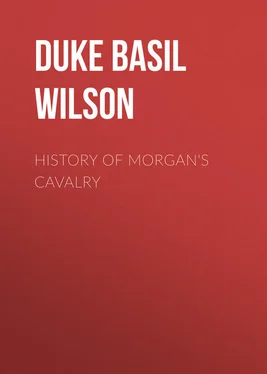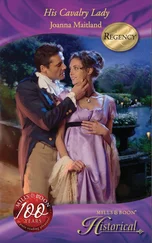Basil Duke - History of Morgan's Cavalry
Здесь есть возможность читать онлайн «Basil Duke - History of Morgan's Cavalry» — ознакомительный отрывок электронной книги совершенно бесплатно, а после прочтения отрывка купить полную версию. В некоторых случаях можно слушать аудио, скачать через торрент в формате fb2 и присутствует краткое содержание. Издательство: Иностранный паблик, Жанр: foreign_antique, foreign_prose, на английском языке. Описание произведения, (предисловие) а так же отзывы посетителей доступны на портале библиотеки ЛибКат.
- Название:History of Morgan's Cavalry
- Автор:
- Издательство:Иностранный паблик
- Жанр:
- Год:неизвестен
- ISBN:нет данных
- Рейтинг книги:3 / 5. Голосов: 1
-
Избранное:Добавить в избранное
- Отзывы:
-
Ваша оценка:
- 60
- 1
- 2
- 3
- 4
- 5
History of Morgan's Cavalry: краткое содержание, описание и аннотация
Предлагаем к чтению аннотацию, описание, краткое содержание или предисловие (зависит от того, что написал сам автор книги «History of Morgan's Cavalry»). Если вы не нашли необходимую информацию о книге — напишите в комментариях, мы постараемся отыскать её.
History of Morgan's Cavalry — читать онлайн ознакомительный отрывок
Ниже представлен текст книги, разбитый по страницам. Система сохранения места последней прочитанной страницы, позволяет с удобством читать онлайн бесплатно книгу «History of Morgan's Cavalry», без необходимости каждый раз заново искать на чём Вы остановились. Поставьте закладку, и сможете в любой момент перейти на страницу, на которой закончили чтение.
Интервал:
Закладка:
He was a better strategist than tactician. He excelled in the arts which enable a commander to make successful campaigns and gain advantages without much fighting, rather than in skillful maneuvering on the field.
He knew how to thoroughly confuse and deceive an enemy, and induce in him (as he desired) false confidence or undue caution; how to isolate and persuade or compel him to surrender without giving battle; and he could usually manage, although inferior to the aggregate of the hostile forces around him, to be stronger or as strong at the point and moment of encounter.
The tactics he preferred, when he chose to fight, were attempts at surprise and a concentration of his strength for headlong dashing attacks.
To this latter method there were some objections. These attacks were made with a vigor, and inspired in the men a reckless enthusiasm, which generally rendered them successful. But if the enemy was too strong, or holding defensible positions, was resolute and stubborn in resistance, and the first two or three rushes failed to drive him, the attack was apt to fail altogether, and the reaction was correspondent to the energy of the onset.
He did not display so much ability when operating immediately with the army, as when upon detached service. He would not hesitate to remain for days closely confronting the main forces of the enemy, keeping his videttes constantly in sight of his cantonments, observing his every movement, and attacking every detachment and foraging party which he could expect to defeat. But when a grand advance of the enemy was commenced he preferred making a timely and long retreat, followed by a dash in some quarter where he was not expected, rather than to stubbornly contest their progress.
He could actively and efficiently harass a retreating army, multiplying and continuing his assaults until he seemed ubiquitous; but he was not equally efficient in covering a retreat or retarding an advance in force. Upon one or two occasions, when the emergency was imminent, he performed this sort of service cheerfully and well, but he did not like it, nor was he eminently fitted for it. He had little of that peculiar skill with which Forrest would so wonderfully embarrass an enemy's advance, and contesting every inch of his march, and pressing upon him if he hesitated or receded, convert every mistake that he made into a disaster.
In attempting a delineation of General Morgan's character, mention ought not to be omitted of certain peculiarities, which to some extent, affected his military and official conduct.
Although by no means a capricious or inconsistent man, for he entertained profound convictions and adhered to opinions with a tenacity that often amounted to prejudice, he frequently acted very much like one.
Not even those who knew him best could calculate how unusual occurrences would affect him, or induce him to act.
It frequently happened that men for whose understandings and characters he had little respect, but who were much about his person, obtained a certain sort of influence with him, but they could keep it only by a complete acquiescence in his will when it became aroused. He sometimes permitted and even encouraged suggestions from all around him, listening to the most contradictory opinions with an air of thorough acquiescence in all. It was impossible, on such occasions, to determine whether this was done to flatter the speakers, to mislead as to his real intentions, or if he was in fact undecided.
He generally ended such moments of doubt by his most original and unexpected resolutions, which he would declare exactly as if they were suggestions just made by some one else, almost persuading the parties to whom they were attributed that they had really advanced them. In his judgment of the men with whom he had to deal, he showed a strange mixture of shrewdness and simplicity. He seldom failed to discern and to take advantage of the ruling characteristics of those who approached him, and he could subsidize the knowledge and talents of other men with rare skill. He especially excelled in judging men collectively. He knew exactly how to appeal to the feelings of his men, to excite their enthusiasm, and stimulate them to dare any danger and endure any fatigue and hardship. But he sometimes committed the gravest errors in his estimation of individual character. He more than once imposed implicit confidence in men whom no one else would have trusted, and suffered himself to be deceived by the shallowest imposters. He obtained credit for profound insight into character by his possession of another and very different quality. The unbounded influence he at once acquired over almost every one who approached him, enabled him to make men do the most uncharacteristic things, and created the impression that he discovered traits of character hidden from others.
General Morgan had more of those personal qualities which make a man's friends devoted to him, than any one I have ever known.
He was himself very warm and constant in the friendships which he formed. It seemed impossible for him to do enough for those to whom he was attached, or to ever give them up. His manner when he wished, prepossessed every one in his favor. He was generally more courteous and attentive to his inferiors than to his equals and superiors. This may have proceeded in a great measure from his jealousy of dictation and impatience of restraint, but was the result also of warm and generous feelings. His greatest faults, arose out of his kindness and easiness of disposition, which rendered it impossible for him to say or do unpleasant things, unless when under the influence of strong prejudice or resentment. This temperament made him a too lax disciplinarian, and caused him to be frequently imposed upon. He was exceedingly and unfeignedly modest. For a long time he sought, in every way, to avoid the applause and ovations which met him every where in the South, and he never learned to keep a bold countenance when receiving them.
It was distressing to see him called on (as was of course often the case) for a speech – nature certainly never intended that he should win either fame or bread by oratory.
When complimented for any achievement he always gave the credit of it to some favorite officer, or attributed it to the excellence of his troops. Nothing seemed to give him more sincere pleasure than to publicly acknowledge meritorious service in a subaltern officer or private, and he would do it in a manner that made it a life long remembrance with the recipient of the compliment.
When displeased, he rarely reprimanded, but expressed his displeasure by satirically complimenting the offender; frequently the only evidence of dissatisfaction which he would show was a peculiar smile, which was exceeding significant, and any thing but agreeable to the individual conscious of having offended him.
His personal appearance and carriage were striking and graceful. His features were eminently handsome and adapted to the most pleasing expressions. His eyes were small, of a grayish blue color, and their glances keen and thoughtful. His figure on foot or on horseback was superb.
He was exactly six feet in hight, and although not at all corpulent, weighed one hundred and eighty-five pounds.
His form was perfect and the rarest combination of strength, activity and grace. His constitution seemed impervious to the effects of privation and exposure, and it was scarcely possible to perceive that he suffered from fatigue or lack of sleep. After marching for days and nights without intermission, until the hardiest men in his division were exhausted, I have known him, as soon as a halt was called, and he could safely leave his command, ride fifty miles to see his wife. Although a most practical man in all of his ideas, he irresistibly reminded one of the heroes of romance. He seemed the Fra-Moreale come to life again, and, doubtless, was as much feared and as bitterly denounced as was that distinguished officer.
Читать дальшеИнтервал:
Закладка:
Похожие книги на «History of Morgan's Cavalry»
Представляем Вашему вниманию похожие книги на «History of Morgan's Cavalry» списком для выбора. Мы отобрали схожую по названию и смыслу литературу в надежде предоставить читателям больше вариантов отыскать новые, интересные, ещё непрочитанные произведения.
Обсуждение, отзывы о книге «History of Morgan's Cavalry» и просто собственные мнения читателей. Оставьте ваши комментарии, напишите, что Вы думаете о произведении, его смысле или главных героях. Укажите что конкретно понравилось, а что нет, и почему Вы так считаете.












